UCSF to Host Bay Area Science Festival Lectures at Lunchtime

UCSF's leading scientists will participate in five discussions about fascinating topics, such as how to handle stress and the latest advances in diabetes, as part of the first-ever Bay Area Science Festival, slated to culminate with a science extravaganza at AT&T Park on November 6.
The UCSF community and the public at large are invited to attend these free presentations, from Monday, Oct. 31 to Friday, Nov. 4 at several UCSF locations. The schedule of these informal talks is posted below.
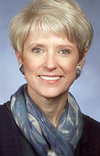
Margaret A. Chesney, PhD
Monday, Oct. 31, noon to 1 p.m., “Stressed Out? Why to Slow Down and How”
UCSF School of Nursing, room N 225, Parnassus campus
UCSF experts describe how the science behind stress, how it changes your body, even at the cellular level, and affects everything from aging to your risk of contracting disease. Learn about innovative research on stress, health implications we may predict in the future, in addition to proven ways such as positive emotions to reduce stress in your life today.
Speakers are:
- Margaret A. Chesney, PhD, director, UCSF Osher Center for Integrative Medicine and distinguished professor of medicine, UCSF School of Medicine
- Elissa S. Epel, PhD, associate professor in the UCSF Department of Psychiatry
- Judy Moskowitz, PhD, UCSF Osher Center for Integrative Medicine.
Tuesday, Nov. 1, 12:30 to 1:30 p.m., “Diabetes: The State of the Epidemic”
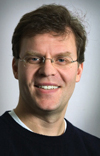
Matthias Hebrok, PhD
UCSF School of Nursing, room N 225, Parnassus campus
This talk will be streamed live on the web.
Nearly a century has passed since the discovery of injectable insulin in the 1920s turned the tide on diabetes, helping to save countless lives. Today, even as research into the disease proceeds apace, the diabetes epidemic continues to grow. In California alone, an estimated 4 million people (one out of every seven adults) have diabetes, and the disease costs the U.S. health care system more than $200 billion annually. What solutions can modern laboratory and clinical research provide? How close are we to finding new ways to prevent, treat, better manage, or even cure the disease? How can public health approaches address the epidemic?
Speakers are:
- Matthias Hebrok, PhD, Hurlbut-Johnson Distinguished Professor in Diabetes Research, director of the UCSF Diabetes Center
- Jeffrey A. Bluestone, PhD, A.W. and Mary Margaret Clausen Distinguished Professor and UCSF Executive Vice Chancellor and Provost
- Stephen E. Gitelman, MD, Mary B. Olney, MD / KAK Chair in Pediatric Diabetes and Clinical Research, Director, Pediatric Diabetes Program
- Dean Schillinger, MD, Chief, Division of General Internal Medicine, San Francisco General Hospital, Director, Health Communication Program, UCSF Center for Vulnerable Populations, Chief, CA Diabetes Program, CA Department of Public Health
Wednesday, Nov. 2, noon to 1 p.m., “Retraining the Brain”
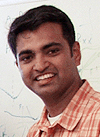
Sri Nagarajan, PhD
Health Sciences West, room 303, Parnassus campus
Join David Ewing Duncan, bestselling author and chief correspondent of public radio's Biotech Nation will be in conversation with three leading UCSF researchers as they discuss the prospects for retraining the brain to perform better. Their explorations range from investigations of how the brain works, to the development of practical remedies for maladies driven by impaired brain function. Among the ailments they are working to help with new strategies are patients with schizophrenia, individuals who have lost arms and struggle with prosthetic limbs – and everyone whose recall is compromised by everyday distractions that challenge the memory.
Speakers are:
- John Ewing Duncan, author, “Experimental Man,” chief correspondent, Biotech Nation
- Adam Gazzaley, MD, PhD founding director of the UCSF Neuroscience Imaging Center
- Sri Nagarajan, PhD, professor of radiology and biomedical imaging at UCSF
- Philip Sabes, PhD, associate professor of physiology at UCSF
Thursday, Nov. 3, noon to 1 p.m., “Experiments in Space”
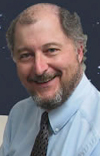
Nick Kanas, MD
Cole Hall Auditorium, Medical Sciences Building, Parnassus campus
Biomedical research in space has yielded a wealth of insights into the effects of weightlessness on the human body, particularly bones, and the effects of long space missions on the mind. As we mark the final U.S. space shuttle mission in July 2011, this panel, including author Mary Roach, reviews advances in space medicine over the last 60 years and reflects on what the future might hold. Roach's book “Packing for Mars: The Curious Science of Life in the Void” (2010) is the recommended book during the Bay Area Science Festival.
Speakers are:
- Mary Roach, a columnist and popular science author, who has published four books, including “Packing for Mars: The Curious Science of Life in the Void”
- Nick Kanas, MD, professor emeritus of psychiatry at UCSF.
Friday, Nov. 4, 12:30 to 1:30 p.m., “Gut Check: The Hidden World of Microbes”
Byers Auditorium, Genentech Hall, Mission Bay campus
Join acclaimed science writer Carl Zimmer in conversation with two of UCSF’s leading researchers as they explore how we have evolved to coexist with – and sometimes depend upon – the microbes that inhabit our world. The discussion will take us on a tour of human’s most minute friends and foes, from malaria to viruses and e. coli, shedding light on how they’ve evolved alongside us, new approaches to stop them, and the possibility of using the bacteria within our guts to create a new generation of antibiotics.
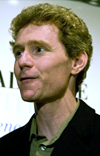
Joe DeRisi, PhD
Speakers are:
- Carl Zimmer, author, “A Planet of Viruses,” and “Microcosm: E.coli and the New Science of Life”
- Joe DeRisi, PhD, Howard Hughes Investigator and professor of Biochemistry & Biophysics at UCSF
- Michael Fischbach, PhD, associate professor of Bioengineering & Therapeutic Sciences at UCSF
About the Speakers at UCSF's Science at Lunch Series
Listed in alphabetical order
Jeffrey A. Bluestone, PhD, holds the A.W. and Mary Margaret Clausen Distinguished Professorship in Metabolism and Endocrinology and is current director of the Hormone Research Institute. He joined the UCSF faculty in 2000 and was appointed Executive Vice Chancellor and Provost (EVCP) in March 2010 to serve as chief academic officer guiding the research and academic enterprise at UCSF and overseeing the campus ethics and compliance enterprise. Prior to his appointment as EVCP, Bluestone served as the director of the UCSF Diabetes Center, where he emphasized translating basic research in both type 1 and type 2 diabetes into improved therapies for patients. Bluestone founded and directed the Immune Tolerance Network, a consortium of more than 1,000 of the world’s leading scientific researchers and clinical specialists from nearly 50 institutions, with the mission of testing new therapies to promote immune tolerance in transplantation, autoimmune diseases, asthma and allergic diseases. As an international scientist and leader in the field of immunotherapy, Bluestone has helped to clarify the body’s immune response on a molecular level, and has catalyzed recent progress in stem cell research, islet cell transplantation and immune tolerance therapies – studies that have been translated into drugs to treat human disease. Throughout his 30-year scientific career, Bluestone has authored more than 300 peer-reviewed publications. He has received numerous awards for his work, including his 2006 election to the American Academy of Arts and Sciences, the Mary Tyler Moore & Robert Levine Excellence in Clinical Research Award and the Gerold & Kayla Grodsky Distinguished Basic Scientist Award from the Juvenile Diabetes Research Foundation.
Margaret A. Chesney, PhD, director, UCSF Osher Center for Integrative Medicine and distinguished professor of medicine, UCSF School of Medicine oversees programs in integrative medicine research, education and patient care, all of which emphasize the combined use of modern medicine with complementary approaches and established healing practices to promote health, wellness and healing. She was a professor of medicine and associate director of the Center for Integrative Medicine at the University of Maryland, School of Medicine and the first deputy director of the National Institutes of Health’s Center for Complementary and Alternative Medicine (NCCAM).During her time at NCCAM, she also served as the director of the Division of Extramural Research and Training and was the senior advisor to the director of the Office of Behavioral and Social Sciences Research at National Institutes of Health (NIH). Prior to her work at the NIH, Chesney was professor of Medicine at the UCSF School of Medicine. The focus of her research has been on the role the individual can play in the promotion of personal health, prevention of disease, and the maintenance of optimal well-being across the lifespan, even in the face of serious health challenges, such as cardiovascular disease and HIV/AIDS. Chesney’s awards are numerous. She received the Charles C. Shepard Science Award from the Centers for Disease Control and Prevention in 1999 and the Director’s Award for work in Mind-Body Medicine from the director of the NCCAM in 2005.
Joseph DeRisi, PhD, is currently a professor and a Howard Hughes Medical Investigator at UCSF in the Department of Biochemistry and Biophysics. Prior to joining the faculty at UCSF in 1999, DeRisi was a UCSF Fellow. He completed his graduate work at Stanford University in the laboratory of Patrick O. Brown, where he was one of the early pioneers of DNA microarray technology and whole genome expression profiling. He is nationally recognized for his efforts to make this technology and the data it generates accessible and freely available. DeRisi also served as the lead instructor of the popular Cold Spring Harbor Laboratory course “Making and Using cDNA Microarrays.” DeRisi has been a Searle Scholar and Packard Fellow, and holds the first Tomkins Chair at UCSF. He was the recipient of the 2001 JPMorgan Chase Health award, the 2004 WIRED RAVE award, a MacArthur Award in 2004 and the Chabot Space and Science Center’s “Scientist of the Year” award. DeRisi’s laboratory is now focused on topics related to infectious disease, especially Plasmodium falciparum, and various viral pathogens.
David Ewing Duncan is an award-winning, best-selling author of seven books published in 19 languages; he is a journalist and a television, radio and film producer and correspondent. His most recent book is the bestseller Experimental Man: What One Man's Body Reveals About His future, your health, and our toxic world. He is the chief correspondent of public radio's Biotech Nation; and a columnist for Fortune. He is also the director of the Center of Life Science Policy at UC Berkeley.
Elissa S. Epel, PhD, associate professor in the UCSF Department of Psychiatry, is also a faculty member in the Health Psychology Postdoctoral Program, the Osher Center for Integrative Medicine, and the Robert Wood Johnson Health and Society Scholars Program. Epel is one of the founders of the UCSF Center for Obesity Assessment, Study & Treatment (COAST,) and serves as a co-director. Through her research on stress and training in the Yale Center for Eating and Weight disorders, she became interested in the intricate relationships between chronic psychological stress, eating behavior, and energy balance. She completed a clinical internship focusing on Behavioral Medicine at the Veterans Affairs Palo Alto Health Care System. Her research examines relationships among chronic stress, social status, coping processes, and neuroendocrine and metabolic sequelae. Epel has several ongoing laboratory and field studies examining stress response and the connection between stress and aging.
Michael Fischbach, PhD, is an assistant professor in the Department of Bioengineering and Therapeutic Sciences at UCSF and a member of the California Institute of Quantitative Biosciences (QB3). His laboratory uses a combination of genomics and chemistry to identify and characterize small molecules from microbes, with an emphasis on the human microbiome. Fischbach received his PhD degree in chemistry from Harvard in 2007, where he worked jointly in the laboratories of Christopher Walsh and David Liu on the role of iron acquisition in bacterial pathogenesis and on the biosynthesis of antibiotics. Before coming to UCSF, Fischbach spent two years as an independent fellow at Massachusetts General Hospital coordinating a collaborative effort based at the Broad Institute to develop genomics-based approaches to the discovery of small molecules from microbes. Fischbach is a recipient of the National Institutes of Health Director's New Innovator Award, a Medical Research award from the W.M. Keck Foundation, and the Young Investigator Grant for Probiotics Research from the Global Probiotics Council.
Adam Gazzaley, MD, PhD, is the founding director of the Neuroscience Imaging Center at the University of California, San Francisco. He studies the neural mechanisms of perception, attention and memory in humans, with an emphasis on the impact of distraction and multitasking on these abilities. A major focus of his research has been on the alterations in the aging brain that lead to cognitive decline. His most recent studies explore how we can use this knowledge to enhance our cognitive abilities through the use of video games. Gazzaley has delivered over 200 invited presentations and his research and perspectives have been consistently profiled in high-impact media, such as The New York Times, Wall Street Journal, TIME, Discover, PBS, NPR, CNN and NBC Nightly News.
Stephen E. Gitelman, MD, is professor of Clinical Pediatrics at the UCSF School of Medicine. He is the director of the Pediatric Diabetes Program and holds the Mary B. Olney, MD / KAK Chair in Pediatric Diabetes and Clinical Research. Gitelman is a clinical and translational researcher primarily involved in clinical trials with immuno-therapies to alter the natural course of type 1 diabetes — studies to predict risk for diabetes, and prevent it from occurring, and to preserve insulin producing beta cell function in those with recent onset disease. Gitelman received his medical degree from the University of North Carolina at Chapel Hill in 1984. He completed pediatric residency and pediatric endocrinology fellowship training at UCSF before joining the faculty in 1990.
Matthias Hebrok, PhD, is Hurlbut-Johnson Endowed Chair in Diabetes Research, professor and director at UCSF Diabetes Center. He is the recipient of many honors and awards, including the JDRF Scholar Award. He received his BS degree in cellular biology from Albert-Ludwigs University in Freiburg, Germany; and his PhD degree from Max-Planck-Institute. His postdoctoral research was performed at the Howard Hughes Medical Institute and at Harvard University. His laboratory uses cell, molecular, and developmental biology tools to decipher the molecular mechanisms that underlie mammalian pancreas organogenesis and pancreatic diseases. The goal of these studies is to optimize existing and develop novel methods to generate functional, insulin-producing beta-cells from human stem cell populations, including human embryonic stem cells (hESCs) and induced pluripotent stem cells (iPCs).
Nick Kanas, MD, professor emeritus of psychiatry at UCSF, has studied the psychological interactions of people under stress and ways they can cope better with stressors in their environment. His earlier work involved groups of veteran patients suffering from alcoholism, PTSD, and schizophrenia. For more than 12 years, he has studied astronauts living and working in space. He has been the Principal Investigator of large NASA-funded international studies involving the Mir and International Space Stations and one that looked at training astronauts to deal with psychological stressors in space. In 1999, Kanas received the Aerospace Medical Association Raymond F. Longacre Award for Outstanding Accomplishment in the Psychological and Psychiatric Aspects of Aerospace Medicine. In 2003, he received the J. Elliott Royer Award for excellence in Academic Psychiatry. Kanas is the co-author of a book titled “Space Psychology and Psychiatry,” which was the recipient of the 2004 International Academy of Astronautics Life Sciences Book Award.
Sri Nagarajan, PhD, is a professor with the Department of Radiology and Biomedical Imaging and also with the Department of Bioengineering and Therapeutic Sciences at UCSF. His research interests are to better understand neural mechanisms of brain plasticity, sensorimotor learning and speech motor control through advancements in high-fidelity functional brain imaging. He also has been working with UCSF colleagues to develop and test approaches for improving cognitive function in individuals diagnosed with schizophrenia.
Mary Roach grew up in a small house in Etna, New Hampshire. She graduated from Wesleyan in 1981, and then moved out to San Francisco. She spent a few years working as a freelance copy editor before landing a half-time PR job at the San Francisco Zoo. During that time, she wrote freelance articles for the local newspaper's Sunday magazine. Though she mostly focuses on writing books, she writes the occasional magazine piece. These have run in Outside, National Geographic, New Scientist, Wired, and The New York Times Magazine, as well as many others. A 1995 article of hers called "How to Win at Germ Warfare" was a National Magazine Award Finalist, and in 1996, her article on earthquake-proof bamboo houses took the Engineering Journalism Award in the general interest magazine category. Mary Roach also reviews books for The New York Times. Her first book, Stiff, was an offshoot of a column she wrote for Salon.com. Her other books include “Spook: Science Tackles the Afterlife,” “Bonk: The Curious Coupling of Science and Sex”, and “Packing for Mars: The Curious Science of Life in the Void.”
Philip Sabes, PhD, is an associate professor of physiology at UCSF. His research focuses how the brain flexibly adapts to integrate sensory information to plan movements. He aims to develop the ability to write information into the brain to improve control over prosthetic arms, by learning how underlying neural circuits change through sensory feedback and learning. His work employs techniques such as human psychophysics, computational modeling and large-scale, simultaneous recording of electrical activity from 50 to 200 neurons in two to three cortical areas within the brain.
Dean Schillinger, MD, is professor of Medicine in Residence at UCSF, and chief of the UCSF Division of General Internal Medicine at San Francisco General Hospital (SFGH) and Trauma Center. He is a practicing primary care physician at SFGH, a UCSF-affiliated urban public hospital, where he sees patients, teaches in the primary care residency program, and conducts research on literacy, health communication, chronic disease prevention and management. Schillinger is the founding director of the UCSF Center for Vulnerable Populations, which conducts innovative research to prevent and treat chronic disease in populations for whom social conditions often conspire to both promote chronic disease and make its management more challenging. In his capacity as Chief of the Diabetes Prevention and Control Program for the California Department of Public Health, he has been expanding the program’s work in health communications, social and environmental determinants of diabetes and health disparities.
Carl Zimmer is the author of ten books about science. His works include “Soul Made Flesh,” a history of neuroscience, which was named one of the top 100 books of the year by The New York Times Book Review, and dubbed a "tour-de-force" by The Sunday Telegraph. His book, “Evolution: The Triumph of an Idea” was called "as fine a book as one will find on the subject" by Scientific American. His other books include “At the Water's Edge,” a book about major transitions in the history of life; “The Smithsonian Intimate Guide to Human Origins;” and “Parasite Rex,” which the Los Angeles Times described as "a book capable of changing how we see the world." “Microcosm: E. coli and the New Science of Life,” published in 2008 was hailed by The Boston Globe as "superb...quietly revolutionary." It was a finalist for the 2009Los Angeles Times Science Book Prize. The New York Times Book Review calls Carl Zimmer "as fine a science essayist as we have."